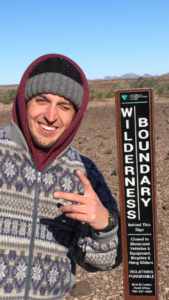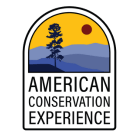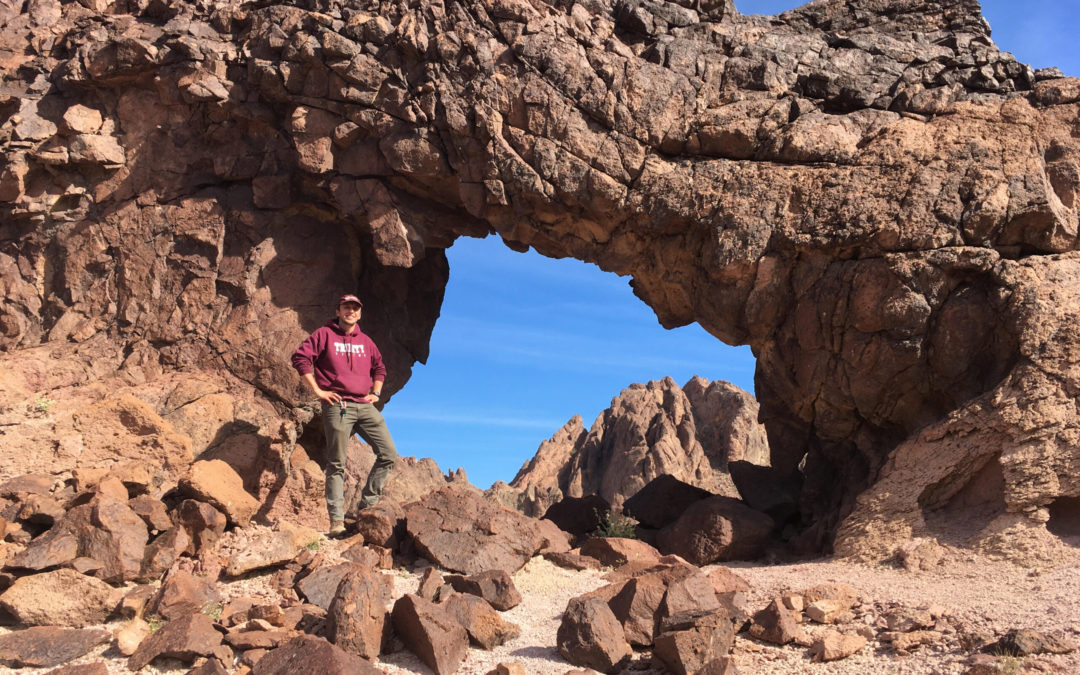Alumni Name: Jack Stark
Pronouns: He/Him/His
Dates Served: Crew Member: May – August 2018, EPIC Internship: January-August 2020
What roles was Jack in: Crew Member: Habitat Restoration, EPIC Internship: Resource Inventory Team with the California Bureau of Land Management
Locations: Crew Member: Southeast, Asheville, North Carolina + EPIC Internship: Southern California

Q: What were you doing before ACE?
A: I grew up in the Texas Hill Country and always enjoyed being outdoors but had never considered conservation as a career option. In college I majored in biology, and like many biology majors I entered university convinced I wanted a career in medicine. Thankfully, a conservation biology course during my sophomore year helped me realize all the great career options in the conservation field.
Q: How did you hear about ACE?
A: In the spring of 2018, towards the end of my junior year, I started looking for conservation internships. If I remember correctly, I just googled “summer conservation internships” and was lucky enough to come across the ACE website. After looking around for a bit at the different places I could go as a Crew member and the great experience I could get, I knew I had to apply. I applied for a 3-month term as a “Habitat Restoration Specialist” based at the Asheville, NC branch. It was perfect for me as a biology major because it focused on invasive plants.
Q: Walk me through your time at ACE – What was your favorite aspect of being an ACE Crew member and EPIC Intern?
A: I’d say my favorite aspect of both my time as an ACE Crew member and an EPIC Intern would have to be getting to visit truly wild pieces of land and helping to protect them. While I enjoy polished national parks with their information centers and paved trails, there is something special about hiking into the woods or the desert with no signs of civilization as far as the eye can see.

Q: Did you have a favorite project? Why?
A: That’s a tough one because there were so many that I really enjoyed, but if I have to pick one it would have to be a water monitoring project during my Bureau of Land Management RIT internship. My RIT partner and I were tasked with collecting data on the condition of 20+ springs in the newly designated Great Falls Basin Wilderness Area in the Mojave Desert near Death Valley. We spent a couple weeks walking all over the basin from spring to spring recording information about water quality, plant and animal life, and several other measurements, which gave us a general idea about the spring’s viability. It was truly a rewarding experience as we got to view first-hand how desert life utilizes these oases and the opportunity to explore a beautiful new wilderness area.
Q: In what ways did ACE shape your life personally and professionally?
A: Personally, I would say it was nice finding a large group of people who are like minded in their commitment to environmentalism and the experience really helped cement my own beliefs in the importance of environmental stewardship through actions big and small. Professionally, I learned a lot of skills that are applicable to outdoor professions. Additionally, I feel it has opened a lot of doors for me especially within the public agency jobs.

Q: How long have you been an ACE Alumni? Where are you now and what comes next?
A: My EPIC internship ended towards the end of July 2020. Though I have enough experience to apply for jobs in one of the agencies, I’ve decided to go back to school. I applied this summer and am set to start this spring to get a Master of Science in Population and Conservation Biology from Texas State University.
Q: Where did you live as an ACE crew member? Any favorite activities? Hikes? What did you do on your off days?
A: The Asheville crew house is a short car ride away from Downtown Asheville. There is a lot to do in the city with plenty of shops, music venues, and breweries, if you’re of age. However, I much preferred all the outdoor activities you can do outside of town (also during COVID times this is probably a much safer option). Asheville is surrounded by National Forest land and sits just off of the Blue Ridge Parkway, so great hikes and beautiful views are abundant. If I had to recommend one hike it’d have to be a sunrise hike of Looking Glass Rock Trail in Pisgah National Forest, just south of town.

Q: What are some of your favorite extracurricular activities?
A: Particularly during COVID times I try to get outside as much as possible, the Texas Hill country is a great place for hiking. I also enjoy tinkering around with a handful of different instruments and I read a few books every now and then. I picked up a “pandemic hobby” a few months ago: wood carving. Though thus far I’ve only made a couple crude looking wooden spoons.
Q: What excites you most about becoming an ACE Alumni Ambassador?
A: I’m excited to help prospective ACE’rs figure out what position would work the best for them. Whether they just want to do a few months of conservation work or they want to start a career, ACE is a great place to start!
Q: If a prospective ACE member were to ask you what the benefits of joining ACE are, what would you say?
A: As a Crew member or EPIC intern you’ll gain lots of experience and forge plenty of professional relationships that will be great for a career with public agencies and conservation. On a more personal level though I’d say the interesting, and sometimes odd, people you meet and make friends with along the way is what most ACE’rs, myself included, find to be one of the best parts of an ACE program.


